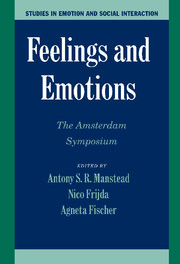Book contents
- Frontmatter
- Contents
- List of Contributors
- 1 Introduction
- PART I THE NATURE OF FEELINGS AND EMOTIONS
- PART II BASIC PSYCHOLOGICAL PROCESSES IN FEELINGS AND EMOTIONS
- PART III FEELINGS AND EMOTIONS: THE PLACE OF PLEASURE
- PART IV FEELINGS AND EMOTIONS IN THEIR SOCIOCULTURAL CONTEXT
- PART V FEELINGS, EMOTIONS, AND MORALITY
- 22 On the Possibility of Animal Empathy
- 23 Emotional Gifts and “You First” Micropolitics
- 24 Introducing Moral Emotions into Models of Rational Choice
- 25 Virtue and Emotional Demeanor
- 26 Epilogue
- Subject Index
- Author Index
- Plate section
- References
26 - Epilogue
Feelings and Emotions – Where Do We Stand?
Published online by Cambridge University Press: 05 June 2012
- Frontmatter
- Contents
- List of Contributors
- 1 Introduction
- PART I THE NATURE OF FEELINGS AND EMOTIONS
- PART II BASIC PSYCHOLOGICAL PROCESSES IN FEELINGS AND EMOTIONS
- PART III FEELINGS AND EMOTIONS: THE PLACE OF PLEASURE
- PART IV FEELINGS AND EMOTIONS IN THEIR SOCIOCULTURAL CONTEXT
- PART V FEELINGS, EMOTIONS, AND MORALITY
- 22 On the Possibility of Animal Empathy
- 23 Emotional Gifts and “You First” Micropolitics
- 24 Introducing Moral Emotions into Models of Rational Choice
- 25 Virtue and Emotional Demeanor
- 26 Epilogue
- Subject Index
- Author Index
- Plate section
- References
Summary
Our main objective in organizing the symposium of which this book is the outcome was to provide an overview of current theory and findings in the study of emotion. As mentioned in the Introduction, the restrictions of our schedule meant that we could not accommodate all relevant viewpoints and findings. This resulted in our selection of twenty-four contributions, here twenty-four chapters.
Although the range and quality of the contributions are impressive, not all of the potentially relevant disciplines are represented. Missing disciplines include computer science, psychiatry, psychoanalysis, and linguistics. Nevertheless, we believe that this volume provides a good reflection of the current state of the art, partly because of the broad range of the topics addressed, but also because many of the chapters refer to important work by others than their authors, both within and outside their own discipline.
For us, the organizers, the symposium was a great pleasure. It contained much that is highly fascinating in terms of new findings and novel insights, providing us with the joys of enhanced understanding and unsuspected implications. We were impressed by the multitude of levels at which emotions can be studied, described, and analyzed. It filled us with respect for the high quality of the presentations and of the reported research.
- Type
- Chapter
- Information
- Feelings and EmotionsThe Amsterdam Symposium, pp. 455 - 468Publisher: Cambridge University PressPrint publication year: 2004
References
- 4
- Cited by



